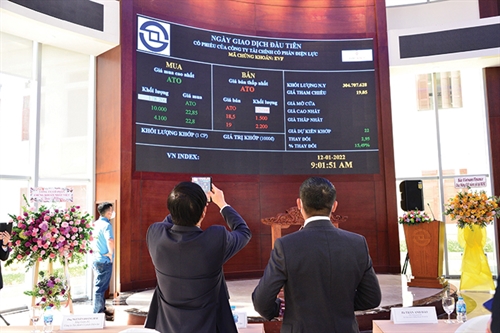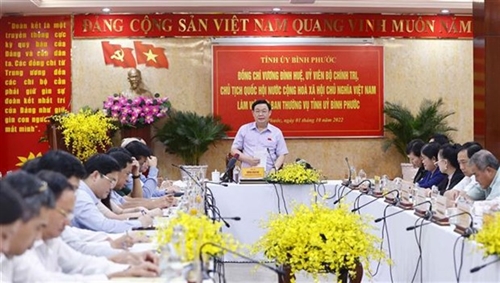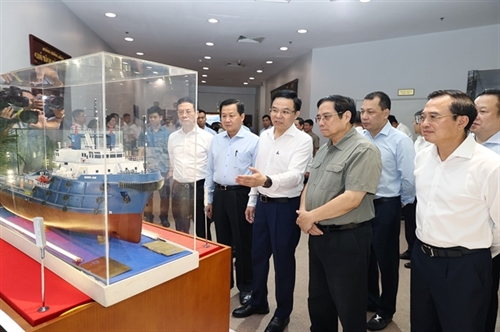In contributing capital to a company, the maker of such contribution will acquire shares in it. Those shares are a type of property that can be used in transactions inside the company and with third parties. This article provides an overview of the applicable rules of Vietnamese law relating to shares.
Dr. Giang Bui Duc[1]
Hanoi School of Business and Management (HSB)
Vietnam National University, Hanoi
Proprietary character of a share
A share means a share in the company’s charter capital. It is the expression of a proprietary relationship between the company and a member or shareholder. A member or shareholder is a proportionate owner of the company and owns the shares. Shares themselves are property that can be transferred. They are called “property rights” under Vietnamese law which should be read as intangible movables.
Shares in a joint-stock company
General provisions
Under Article 114 of Law 59/2020/QH14 on Enterprises dated June 17, 2020, revised in 2022 (the LOE), a joint stock company (JSC) must issue ordinary shares and may create preference shares. Those preference shares include:
- Redeemable preference shares;
- Dividend preference shares;
- Voting preference shares; and,
- Other preference shares as specified in the charter of the company and in the securities legislation.
Persons eligible to purchase dividend preference shares, redeemable preference shares and other preference shares must be stated in the charter of the company or decided by the General Meeting of Shareholders (Article 114.3 of the LOE).
With regard to voting preference shares, only organizations authorized by the Government and founding shareholders have the right to hold them. Voting preference of founding shareholders will be effective within three years as from the date on which the company is granted an enterprise registration certificate. Voting rights and the duration of voting preference with respect to voting preference shares held by the organization authorized by the Government will be stated in the charter of the company. Upon expiry of the duration of voting preference, voting preference shares may be converted into ordinary shares (Article 116.1 of the LOE).
Ordinary shares may not be converted into preference shares. Preference shares may be converted into ordinary shares pursuant to a resolution of the General Meeting of Shareholders (Article 114.5 of the LOE).
Share certificate is defined as a certificate issued by a JSC, book entry or electronic data certifying the ownership of one or more shares of such company (Article 121.1 of the LOE).
The rights and duties attached to owning a share depend upon both the LOE (generally obligatory) and the company’s charter (a matter of contract).
Under Article 135.1 of the LOE, payment of dividends on preference shares will be made in accordance with the respective conditions applicable to each class of preference shares.
 |
| Stocks of Quang Tri Minh Hung JSC. (GMH) and EVN Finance JSC. (EVF) are launched on January 12 at the HOSE__Photo: VNA |
Ordinary shares
Ordinary shares are issued without any special rights being attached to them. They are not subject to limited voting rights as in case of dividend preference shares or redeemable preference shares.
Founding shareholders must together register to subscribe at least 20 percent of the total number of ordinary shares which may be offered for sale when registering the establishment of the JSC (Article 120.2 of the LOE).
Pursuant to Article 135.2 of the LOE, dividends on ordinary shares will be determined on the basis of the realized net profit and payment for dividends will be sourced from profits retained by the company. A JSC may pay dividends on ordinary shares only when it satisfies all the following conditions:
- It has fulfilled its tax obligations and other financial obligations in accordance with law;
- It has made appropriation for all funds of its own and has made up for previous losses in accordance with law and its charter; and,
- Upon payment of all dividends, it is able to fulfill its debt and other property obligations which become due.
- To attend and express opinions at meetings of the General Meeting of Shareholders and to exercise the right to vote directly or through an authorized representative or in other forms specified in the charter of the company and by law; one ordinary share carries one vote;
- To receive dividends with the amount decided by the General Meeting of Shareholders;
- To be given priority in subscribing for new shares in proportion to the ratio of ownership of ordinary shares each shareholder holds in the company;
- To freely assign their shares to other persons, except in the cases provided in Articles 120.3 and 127.1 of the LOE and other relevant laws and regulations;
- To sight, consult and make an extract of information about names and contact addresses on the list of shareholders with voting rights; to request correction of untruthful information about them;
- To sight, consult and make an extract or copy of the charter of the company, minutes of meetings of the General Meeting of Shareholders and resolutions of the General Meeting of Shareholders; and,
- Upon dissolution or bankruptcy of the company, to receive part of the remaining assets in proportion to the ratio of ownership of shares in the company.
Redeemable preference shares
In accordance with Article 118.1 of the LOE, a redeemable preference share carries the possibility of being redeemed or purchased back by the company in the future at the request of its holder or in accordance with the conditions specified in the redeemable preference share certificate and the charter of the company.
Rights of redeemable preference shareholders are the same as those of ordinary shareholders, but they do not have the right to vote, the right to attend meetings of the General Meeting of Shareholders or the right to nominate candidates to the Board of Directors and the Inspection Committee, except the case of voting in a move to adversely vary the rights and duties provided in the shares (Article 118.3 of the LOE).
Dividend preference shares
Article 117.1 of the LOE stipulates: “a dividend preference share is a share for which a dividend is paid at a rate higher than that paid for an ordinary share or at an annual fixed amount. Annually distributed dividends include fixed dividends and bonus dividends. Fixed dividends do not depend on results of the business operation of the company. The specific amount of fixed dividends and method of determination of bonus dividends are specified in dividend preference share certificates”.
Furthermore, upon the dissolution or bankruptcy of the company, dividend preference shareholders may receive part of the remaining assets in proportion to the ratio of ownership of shares in the company after the company fully pays its debts and redeemable preference shares (Article 117.2.b of the LOE).
They have other rights as those of ordinary shareholders but they do not have the right to vote, the right to attend meetings of the General Meeting of Shareholders or the right to nominate candidates to the Board of Directors and the Inspection Committee, except the case of voting in a move to adversely vary the rights and duties set out in the shares (Article 117.3 of the LOE).
Voting preference shares
According to Article 116 of the LOE, a voting preference share is an ordinary share carrying more votes than other ordinary shares. The number of votes per voting preference share is stated in the charter of the company and voting preference shareholders have other rights as ordinary shareholders but may not assign their shares to other persons, except the case of assignment pursuant to a legally effective court judgment or ruling or inheritance.
Other rights of shareholders
Shareholders have other rights, including: the right to assign their shares subject to restrictions in the charter or law (Article 127.1 of the LOE); the right to use their shares as security (Article 15 of Government Decree 21/2021/ND-CP dated March 19, 2021, guiding in detail the implementation of the Civil Code’s provisions on secured transactions); and the right to make a gift of part or all of their shares in the company to other individuals or organizations or use their shares to pay debts. Individuals or organizations receiving such gift or receiving payment of debts by shares will become a shareholder of the company (Article 127.5 of the LOE).
When an individual shareholder dies, his/her heir under a will or at law will become a shareholder of the company (Article 127.3 of the LOE).
The shareholder or a group of shareholders owning at least 1 percent of the total ordinary shares has the right take legal action on his/their own name or on the company’s behalf against a member of the Board of Directors or the Director or General Director of the company (Article 166 of the LOE).
Shareholders holding at least 5 percent of the total ordinary shares of the company or another smaller percentage stated in the charter may (i) request the calling of a meeting of the General Meeting of Shareholders; (ii) sight, consult and make an extract of the book of minutes and resolutions and decisions of the Board of Directors, mid-year and annual financial statements, reports of the Inspection Committee, and contracts and transactions which must be approved by the Board of Directors and other data except data relating to commercial secrets or business secrets of the company; and (iii) request the Inspection Committee to inspect each specific issue relating to the management and administration of the operation of the company where it is considered necessary (Article 115.2 of the LOE).
Obligations of shareholders
Shareholders of all types will be subjected to certain obligations as provided in Article 119 of the LOE as follows:
- To pay in full and on time for shares undertaken to be subscribed.
- To refrain from withdrawing the ordinary share capital contributed from the company in any form, except where shares are redeemed by the company or other persons. Where a shareholder withdraws all or part of the share capital contributed not in accordance with this Clause, such shareholder and any person with related interests in the company must be jointly liable for debts and other proprietary obligations of the company to the extent of the value of shares withdrawn and any damage occurring.
- To comply with the charter and the rules on internal management of the company.
- To observe resolutions and decisions of the General Meeting of Shareholders and the Board of Directors.
- To preserve confidentiality of information provided by the company pursuant to the company charter and law; and to use only information provided in order to perform and protect their lawful rights and interests, and to refrain from distributing, copying or sending such information to other organizations or individuals.
- Other obligations in accordance with the LOE and the charter of the company.
Rights and obligations carried by shares in a multiple-member limited liability company (multiple-member LLC)
Pursuant to Article 49.1 of the LOE, shares in a multiple-member LLC confer upon its members the following rights:
- To attend meetings of the Members’ Council, to discuss, make recommendations and vote on matters falling under the competence of the Members’ Council;
- To have the number of votes in proportion to its capital contribution portion, except the case specified in Article 47.2 of the LOE;
- To have profit distributed to it in proportion to its capital contribution portion after the company fully pays taxes and fulfills all other financial obligations in accordance with law;
- To distribute to it the remainder of the value of assets of the company in proportion to its capital contribution portion in the company upon dissolution or bankruptcy of the company;
- To be given priority in making additional capital contributions to the company upon any increase of charter capital of the company;
- To dispose of its capital contribution portion by way of assignment of all or part of its capital contribution portion, or by gift or other methods in accordance with law and the charter of the company;
- To initiate legal action regarding civil liability on its own name or in the name of the company against the chairman of the Members’ Council, the Director or General Director, the at-law representative or other managers in accordance with Article 72 of the LOE;
- Other rights provided in the LOE and the charter of the company.
As such, a member of a multiple-member LLC has a wide range of rights expressly indicated in the above Article and the company’s charter may also provide for his/her additional rights.
Furthermore, under Article 49.2 of the LOE, a member or a group of members holding at least 10 percent of the charter capital or a smaller percentage as specified in the charter of the company has the following rights:
- To request that a meeting of the Members’ Council be convened to deal with issues within its authority;
- To inspect, sight or consult transaction monitoring records, accounting books and annual financial statements;
- To inspect, sight, consult or copy the register of members, minutes of meetings, resolutions and decisions of the Members’ Council and other documents of the company; and,
- To request a court to cancel a resolution or decision of the Members’ Council within 90 days from the date of closing of a meeting of the Members’ Council if the sequence, procedures and conditions for holding such meeting or the contents of such resolution or decision are inconsistent with or do not comply with the LOE and the charter of the company.
Where a member of the company holds more than 90 percent of the charter capital and where its charter does not confer the above rights upon the other group of members, they automatically have those rights (Article 49.3 of the LOE).
Pursuant to Article 50 of the LOE, the members of a multiple-member LLC has the following obligations:
- To contribute in full and on time the amount of capital as undertaken and to be liable for debts and other property obligations of the company to the extent of the amount of capital contributed to the company, except cases specified in Articles 47.2 and 47.4 of the LOE.
- To refrain from withdrawing its contributed capital from the company in any form, except cases specified in Articles 51, 52, 53 and 68 of the LOE.
- To comply with the charter of the company.
- To observe resolutions and decisions of the Members’ Council.
- To bear personal liability for the following acts in the name of the company: (i) Violation of law; (ii) Conduct of business or other transactions not in the interests of the company and thereby causing loss to other persons; (iii) Premature payment of debts in cases where the company is likely to be in financial danger; and
- Other obligations provided in the LOE.
Transfer of shares
In a JSC
Under Article 127 of the LOE, shares can be freely transferred between parties except in the following cases:
(i) The company’s charter imposes restrictions on transfer. For example, a JSC’s charter may give its at-law representative the right to refuse to register shares that have been transferred to others.
(ii) Within a period of three years from the date of issuance of the enterprise registration certificate to the company, ordinary shares of a founding shareholder may be freely assigned to other founding shareholders, and may only be assigned to persons other than founding shareholders upon approval of the General Meeting of Shareholders. In this case, founding shareholders intending to assign ordinary shares may not vote on the assignment of such shares. Those restrictions do not apply to (i) additional ordinary shares which founding shareholders have after the registration of the establishment of the enterprise, or (ii) shares that have been assigned to persons other than founding shareholders (Articles 120.3 and 120.4 of the LOE).
In principle, where shares can and have been transferred, the company must be notified of the change of shareholder(s).
The company must register shareholder changes in the register of shareholders at the request of the related shareholders within 24 hours after receipt of the request in accordance with the charter of the company (Article 127.7 of the LOE).
Under Article 127.6 of the LOE, once such registration is completed, the new shareholder acquires all the rights attached to the shares (such as the right to vote at meetings or right to receive a dividend) and becomes a part-owner of the company.
The company is required to notify the Business Registration Office of change of its founding shareholders or shareholders being foreign investors within ten days following the change except the case of a listed company (Articles 31.1.b and 31.2 of the LOE).
Shares in a multiple-member LLC
Shares in a multiple-member LLC are termed “capital contribution portion”. Pursuant to Article 52.1 of the LOEs, except in the cases specified in Articles 51.4, 53.6 and 53.7 of the LOE, a member of a multiple-member LLC has the right to assign all or part of its/his/her capital contribution portion to other persons as follows:
- Offering such capital contribution portion for sale to all other members in proportion to their respective capital contribution portions in the company on equal terms of offer;
- Assigning to non-members on the same conditions as the offer applicable to other members as specified above when other members of the company do not purchase or do not purchase in full within 30 days from the date of offer.
In principle, where shares can and have been transferred, the company must be notified of the change of member.
The company must promptly register changes of members in the register of members at the request of the related members in accordance with its charter (Article 48.3 of the LOE).
According to Article 52.3 of the LOE, once such registration is completed, the new member acquires all the rights attached to the shares (such as the right to vote at meetings or right to receive a dividend) and becomes a part-owner of the company.
The company is required to register change of its members with the Business Registration Office within ten days following the change (Article 30 of the LOE).
Purchase by a company of its own shares
A company may purchase its own shares in some exceptional circumstances.
Pursuant to Article 51.1 of the LOEs, a member of a multiple-member LLC may demand that the company redeem its capital contribution portion if such member votes against a resolution or decision of the Members’ Council on the following issues:
- Amendment of or addition to the provisions of the charter of the company relating to the rights and obligations of members and of the Members’ Council;
- Reorganization of the company; and,
- Other cases as specified in the charter of the company.
The demand for redemption of capital contribution portions must be made in writing and sent to the company within 15 days from the date on which the resolution or decision was adopted (Article 51.2 of the LOE).
Such purchase will result in the reduction of the company’s charter capital (Article 68.3.b of the LOE) which must be notified to the Business Registration Office within 10 days following the completion of the purchase (Article 68.4 of the LOE). But it is not a simple notification and there appears to be an error in this article. Indeed, the registration of the change to the charter capital is required and will be, upon completion, updated in the company’s enterprise registration certificate (Articles 30.1 and 28.4 of the LOE and Article 51 of Government Decree 01/2021 dated January 4, 2021, on registration of enterprises).
As per Articles 132 and 133 of the LOE, a JSC may purchase its own shares in the following circumstances:
At the request of a shareholder who has voted against a resolution on reorganization of the company or on a change to the rights and obligations of shareholders specified in the charter of the company. Such request must be made in writing and specify the name and address of the shareholder, number of shares of each class, intended selling price, and reason(s) for demanding the redemption by the company. Such demand must be sent to the company within 10 days from the date on which the General Meeting of Shareholders adopted the resolution in question.
As decided by the company. In such case it may redeem no more than 30 percent of the total number of ordinary shares already sold, and all or part of the dividend preference shares already sold. The Board of Directors may decide on the redemption of no more than 10 percent of the total number of shares of each class already sold within a period of 12 months. In other cases, the redemption of shares shall be decided by the General Meeting of Shareholders (Article 133 of the LOE).
Where the holder of redeemable preference shares exercises his/her right to request the company to purchase those shares.
Such purchase will result in the reduction of the company’s charter capital (Article 112.5.b of the LOE).
Pursuant to Article 134.2 of the LOEs, the company will register the reduction of its charter capital corresponding to the total par value of shares redeemed by it within ten days from the date of completion of payment for the redemption of shares, unless otherwise provided by the securities law.
In light of the above, it can be inferred that Vietnamese law addresses various aspects of shares in JSCs and multiple-member LLCs. The rules are however unclear in some respects and therefore need improvements.-









